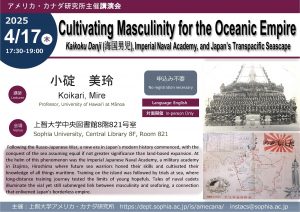|
Mire Koikari is a professor in the Department of Women, Gender, and Sexuality Studies at the University of Hawai‘i at Mānoa. Born and raised in Japan, she spent a number of years in Madison, Wisconsin prior to her relocation to Honolulu, Hawai‘i in 1997. Her major publications include Pedagogy of Democracy: Feminism and the Cold War in the U.S. Occupation of Japan (Temple University Press, 2008), Cold War Encounters in US-Occupied Okinawa: Women, Militarized Domesticity, and Transnationalism in East Asia (Cambridge University Press, 2015), and Gender, Culture, and Disaster in Post-3.11 Japan (Bloomsbury Academic Press, 2020). Her current research focuses on the culture of oceanic masculinity in the context of Japan’s maritime expansionism across the Pacific and beyond. |
| 概要 |
Following the Russo-Japanese War, a new era in Japan’s modern history commenced, with the conquest of the sea assuming equal if not greater significance than land-based expansion. At the helm of this phenomenon was the Imperial Japanese Naval Academy, a military academy in Etajima, Hiroshima where future sea warriors honed their skills and cultivated their knowledge of all things maritime. Training on the island was followed by trials at sea, where long-distance training journey tested the limits of young hopefuls. Tales of naval cadets illuminate the vial yet still submerged link between masculinity and seafaring, a connection that enlivened Japan’s borderless empire. |
